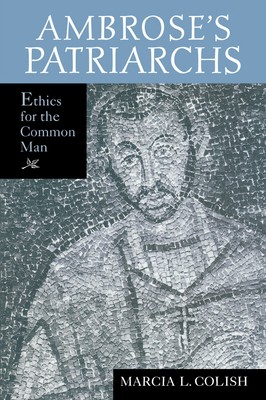
- We will send in 10–14 business days.
- Author: Marcia L Colish
- Publisher: University of Notre Dame Press
- ISBN-10: 0268023654
- ISBN-13: 9780268023652
- Format: 16.1 x 23.5 x 1.4 cm, softcover
- Language: English
- SAVE -10% with code: EXTRA
Reviews
Description
In this welcome new book Marcia L. Colish offers the only monograph-length study of the patriarch treatises of Ambrose of Milan (c. 340-397), in which he develops, for the first time in the patristic period, an ethics for the laity. Ambrose the ethicist has been viewed primarily as the author of advice to those with special callings in the church, such as priests, widows, and consecrated virgins. His views have been characterized as advocating asceticism and promoting a Platonic view of human nature, in which the body is a moral problem. Ambrose's patriarch treatises, argues Colish, are instead aimed at lay people who did not have special callings in the church, but who led active lives in the world as spouses, parents, heads of households, professionals, and citizens. These treatises reveal a different side of Ambrose and show that he developed an ethics of moderation based on an Aristotelian and Stoic anthropology, which he modified in the light of biblical ethics and St. Paul's view of human nature.
Colish's analysis sharply revises previous estimates of Ambrose the ethicist through a careful consideration of the patriarch treatises in their historical context, as Lenten sermons delivered by Ambrose to the catechumens in his Milanese church whom he was preparing during Lent for their coming Easter baptism. The pastoral context and intended audience of these treatises have largely been ignored in previous scholarship. Colish contends that when the treatises are read as Ambrose intended for them to be received, as a corpus of works aimed at the conversion of pagan Roman adults to Christianity, Ambrose's vision of a Christian ethics for the common man emerges.
EXTRA 10 % discount with code: EXTRA
The promotion ends in 15d.03:35:07
The discount code is valid when purchasing from 10 €. Discounts do not stack.
- Author: Marcia L Colish
- Publisher: University of Notre Dame Press
- ISBN-10: 0268023654
- ISBN-13: 9780268023652
- Format: 16.1 x 23.5 x 1.4 cm, softcover
- Language: English English
In this welcome new book Marcia L. Colish offers the only monograph-length study of the patriarch treatises of Ambrose of Milan (c. 340-397), in which he develops, for the first time in the patristic period, an ethics for the laity. Ambrose the ethicist has been viewed primarily as the author of advice to those with special callings in the church, such as priests, widows, and consecrated virgins. His views have been characterized as advocating asceticism and promoting a Platonic view of human nature, in which the body is a moral problem. Ambrose's patriarch treatises, argues Colish, are instead aimed at lay people who did not have special callings in the church, but who led active lives in the world as spouses, parents, heads of households, professionals, and citizens. These treatises reveal a different side of Ambrose and show that he developed an ethics of moderation based on an Aristotelian and Stoic anthropology, which he modified in the light of biblical ethics and St. Paul's view of human nature.
Colish's analysis sharply revises previous estimates of Ambrose the ethicist through a careful consideration of the patriarch treatises in their historical context, as Lenten sermons delivered by Ambrose to the catechumens in his Milanese church whom he was preparing during Lent for their coming Easter baptism. The pastoral context and intended audience of these treatises have largely been ignored in previous scholarship. Colish contends that when the treatises are read as Ambrose intended for them to be received, as a corpus of works aimed at the conversion of pagan Roman adults to Christianity, Ambrose's vision of a Christian ethics for the common man emerges.


Reviews